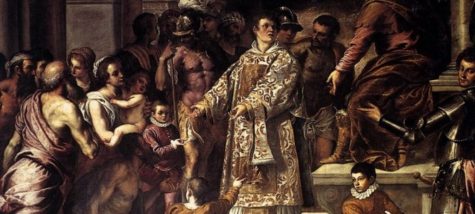A well-known legend has persisted from earliest times. As deacon in Rome, Lawrence was charged with the responsibility for the material goods of the Church, and the distribution of alms to the poor. St. Ambrose of Milan relates that when St. Lawrence was asked for the treasures of the Church he brought forward the poor, among whom he had divided the treasure as alms. “Behold in these poor persons the treasures which I promised to show you; to which I will add pearls and precious stones, those widows and consecrated virgins, which are the church’s crown.”
The prefect was so angry that he had a great gridiron prepared, with coals beneath it, and had Lawrence’s body placed on it,(hence St. Lawrence’s association with the gridiron). After the martyr had suffered the pain for a long time, the legend concludes, he made his famous cheerful remark, “It is well done. Turn me over!” From this derives his patronage of cooks and chefs.
Lawrence is believed to have been born in Spain, at Huesca, a town in Aragon near the foot of the Pyrenees. As a youth he was sent to Zaragoza to complete his humanistic and theological studies. It was here that he first encountered the future Pope Sixtus II, who was of Greek origin. The future Pope was one of the most famous and esteemed teachers in what was then one of the most renowned centres of learning. Eventually, both left Spain for Rome.
When Sixtus was elevated to patriarch in 257, he ordained Lawrence deacon, and though Lawrence was still young, appointed him first among the seven deacons who served in the patriarchal church; therefore he is called archdeacon of Rome. This was a position of great trust, which included the care of the treasury and riches of the church, and the distribution of alms among the poor.
St Cyprian, Bishop of Carthage, notes that Roman authorities had established a norm according to which all Christians who had been denounced must be executed and their goods confiscated by the Imperial treasury. At the beginning of the month of August, 258, the emperor Valerian issued an edict commanding that all bishops, priests, and deacons should immediately be put to death. Sixtus was captured on August 6, 258, at the cemetery of St. Callixtus while celebrating the liturgy and executed forthwith.
After the death of Sixtus, the prefect of Rome demanded that Lawrence turn over the riches of the Church. Ambrose is the earliest source for the tale that Lawrence asked for three days to gather together the wealth. Lawrence worked swiftly to distribute as much Church property to the poor as possible, so as to prevent its being seized by the prefect. On the third day, at the head of a small delegation, he presented himself to the prefect, and when ordered to give up the treasures of the Church, he presented the poor, the crippled, the blind and the suffering, and said that these were the true treasures of the Church. One account records him declaring to the prefect, “The Church is truly rich, far richer than your emperor.” This act of defiance led directly to his martyrdom.




Leave a Reply